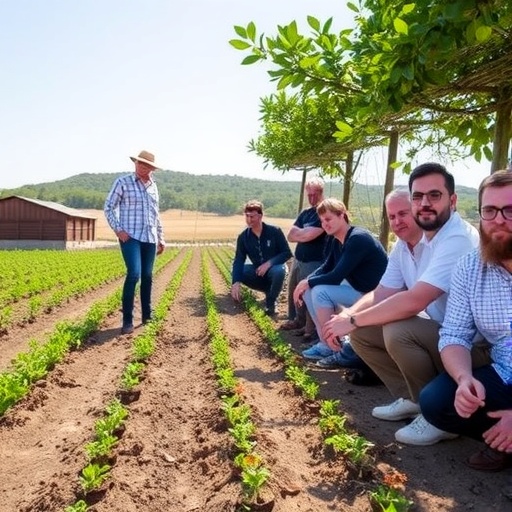In October 2025, the Horizon Europe-funded initiative known as Soils for Europe (SOLO) convened its annual stakeholder meeting at the historic University of Évora in Portugal. This important gathering brought together scientists, policymakers, practitioners, and stakeholders committed to tackling the pervasive challenges threatening soil health across the continent. The event underscored the critical role of soils as a foundational component sustaining terrestrial ecosystems and human welfare, emphasizing the urgency prompted by the recent adoption of the Soil Monitoring and Resilience Directive by the European Commission.
The conference was divided into two complementary segments: the first two days were reserved for internal consortium meetings among the project partners, enabling in-depth progress reports, strategic planning, and coordination. The latter two days opened the floor to external stakeholders, facilitating rich dialogues and practical engagements designed to bridge knowledge gaps and foster applied solutions. Key to these discussions was the intent to inform and influence the European Soil Mission, a flagship program aiming for substantial improvements in soil health by 2030.
SOLO’s comprehensive approach embraces multidisciplinary research and innovation, integrating soil science with agronomy, ecology, and sustainability studies. During the consortium meetings held earlier in Lund in May 2025, partners outlined advancements across multiple Work Packages, spanning soil biodiversity assessments, monitoring technologies, ecosystem service valuations, and governance frameworks. This continuous and transparent knowledge exchange helps streamline efforts, identify bottlenecks, and adapt methodologies with precision.
One of the highlight announcements came from project coordinator Carlos Guerra of the University of Coimbra, who shared plans for the upcoming Soils for Europe conference in 2026. This anticipated event aims to convene a broader scientific community, policymakers, and civil society representatives, catalyzing a collaborative movement toward regenerative soil management practices. Emphasis will be on scalable, evidence-based strategies reflecting insights generated throughout SOLO’s duration.
Field expertise was brought into sharp focus during the stakeholder days, notably through a study visit to a regenerative livestock and cork farm in Alentejo managed by Oliveira Soares. His innovative no-till farming practices defy conventional warnings about soil compaction due to cattle activity and instead demonstrate enhanced soil fertility and structure. Soares’ farm serves as a living laboratory illustrating that eschewing tillage, particularly in the Mediterranean climate, reduces erosion and conserves vital organic matter within soils.
As participants traversed the farmland’s diverse microhabitats, dialogues emerged around the translatability of such regenerative practices across different agro-climatic zones. Concerns about the impact of climate change became a focal point. Stakeholders debated how adaptive strategies might accommodate increasingly variable temperature and precipitation patterns, soil degradation pressures, and biodiversity shifts, highlighting the need for flexible and context-specific solutions.
Beyond the immersive on-site experiences, attendees engaged in collaborative Think Tanks designed to co-create actionable roadmaps. Roundtables encouraged stakeholders to link identified knowledge gaps with priority interventions, creating dynamic timelines that envision both short-term experimentation and long-term policy integration. This process not only enhances collective ownership but also ensures that advances in soil science translate into meaningful societal benefits.
The gathering further emphasized the essential role of monitoring frameworks that incorporate novel sensing technologies, such as remote sensing, in situ sensors, and high-throughput soil biodiversity assays. By harnessing these methods, SOLO partners aim to develop robust indicators capable of capturing subtle changes in soil properties and functions, facilitating early warning systems for soil degradation and aiding adaptive management.
Central to SOLO’s ethos is fostering a landscape in which scientific findings are accessible and actionable for farmers, land managers, and regional authorities. The participatory design of knowledge exchange platforms seeks to empower local actors with tailored guidance, promoting widespread adoption of sustainable soil management practices. This bottom-up approach ensures that policy directives resonate with on-the-ground realities.
Moreover, SOLO endeavors to enhance the visibility and valuation of soil ecosystem services within broader environmental and economic policies. By quantifying the benefits soils provide—from carbon sequestration to nutrient cycling and water retention—the project supports integrated policy frameworks that recognize soil health as pivotal to climate mitigation, biodiversity conservation, and food security.
The consortium’s collaborative spirit and diverse expertise enable a holistic understanding of soil-related challenges and opportunities. As climate change accelerates and land-use pressures intensify, initiatives like SOLO provide critical scientific grounding necessary to transition European agriculture and land management toward resilience and sustainability.
Funded under the European Union’s Horizon Europe Research and Innovation program, SOLO exemplifies the transformative potential of coordinated research endeavors to address urgent environmental issues. While the project’s direct outcomes are eagerly awaited, its inclusive process models a pathway forward for soil science, policy, and practice integration at multiple scales.
In closing, SOLO’s 2025 stakeholder meeting illuminated a shared commitment to protecting and revitalizing Europe’s soils for future generations. It showcased innovative research trajectories, practical successes, and the cooperative frameworks vital to confronting soil degradation comprehensively. The momentum generated augurs well for advancing the ambitious Soil Mission targets and securing healthier soils as the bedrock of thriving ecosystems and communities.
Subject of Research: Soil health, monitoring, resilience, and regenerative agricultural practices in Europe.
Article Title: Advancing Soil Health in Europe: Insights from the 2025 SOLO Consortium and Stakeholder Meeting in Portugal
News Publication Date: October 2025
Web References:
Soil Monitoring and Resilience Directive: https://ec.europa.eu/commission/presscorner/detail/en/qanda_23_3637
Soils for Europe (SOLO) project: https://soils4europe.eu/
Soil Mission: https://research-and-innovation.ec.europa.eu/funding/funding-opportunities/funding-programmes-and-open-calls/horizon-europe/eu-missions-horizon-europe/soil-deal-europe_en
University of Évora: https://www.uevora.pt/en/
University of Coimbra: https://www.uc.pt/en/
Soils for Europe conference 2026: https://soils4europe.eu/soils-europe-conference-2026
Image Credits: Pensoft Publishers
Keywords: Agriculture, Soil health, Sustainability, Regenerative farming, Soil monitoring, Climate change adaptation, Horizon Europe Research, Ecosystem services, Soil biodiversity, EU Soil Mission
Tags: ecosystem sustainability discussionsEuropean Soil Mission 2030Horizon Europe funding projectsinterdisciplinary soil research initiativespractitioners stakeholders collaborationregenerative farming practices Alentejosoil health challenges EuropeSoil Monitoring and Resilience Directivesoil science innovationSOLO stakeholder meeting Portugalsustainable agriculture strategiesUniversity of Évora conference






